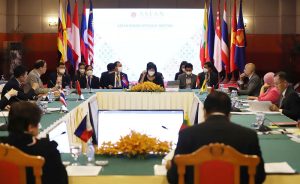This week, Cambodia’s government will host high-level summits and meetings of the Association of Southeast Asian Nations (ASEAN) in Phnom Penh, as the bloc is buffeted by a host of regional and global challenges.
The official centerpiece of the July 31-August 6 program is the 55th ASEAN Foreign Ministers’ Meeting (AMM), which will gather nine of the 10 ASEAN member states (military-ruled Myanmar has been excluded). This will be followed by a number of important regional meetings and summits, including the East Asia Summit Foreign Ministers’ Meeting and ASEAN Regional Forum, among the most prominent Asia-Pacific security conclaves.
The AMM takes place at a fraught juncture for ASEAN. In addition to the perennially difficult question of how to approach the maritime and territorial disputes in the South China Sea, which will no doubt figure during the week’s meetings, the bloc’s unity and effectiveness has been sorely tested by the worsening situation in Myanmar, which has descended into political conflict since the military coup of February 2021. Last week’s execution of four political prisoners by the military junta clearly shocked many ASEAN member states, even those, like current ASEAN chair Cambodia, that went to great lengths to engage with the military administration.
In an ASEAN Chairman’s statement responding to the executions last week, the Cambodian government described the act as “highly reprehensible” – unusually strong language by ASEAN standards. The statement specifically criticized the junta’s choice to ignore a personal plea by Prime Minister Hun Sen to commute the death sentences and to carry out the sentences the week ahead of the AMM – something that can only be interpreted as a finger in ASEAN’s eye. The nature and timing of this escalatory and inflammatory act has increased the pressure on the Southeast Asian organization to reassess its approach to Myanmar’s crisis.
Where this might end up remains unclear, given the need for consensus. In a Facebook post on Friday, Malaysian Foreign Minister Saifuddin Abdullah, who has been among the most outspoken ASEAN officials on the dire situation in Myanmar, raised the possibility that the bloc’s Five-Point Consensus, which called for an immediate cessation of violence and inclusive dialogue involving “all parties,” could be abandoned altogether.
“The ASEAN Summit this November will need to make a big decision,” he wrote. “Will the 5PC be continued? Can it be improved? Or to create something new?”
While the military junta has already been banned from sending political representatives to high-level ASEAN meetings since last October’s summit, the pressure is now mounting within and outside the bloc to take some kind of further action in response. While a decision on this is not likely this week, there is no doubt that the question of how to handle ASEAN’s problem member will no doubt be high on the agenda.
The week’s meetings are also likely to be overshadowed by the growing strategic turbulence surrounding the Russia-Ukraine war and the broader tensions between the United States on the one hand and Russia and China on the other. Both the East Asia Summit Foreign Ministers’ Meeting and the ASEAN Regional Forum will be attended by U.S. Secretary of State Antony Blinken, Chinese Foreign Minister Wang Yi, and Russian Foreign Minister Sergey Lavrov, whose mutual antagonisms will no doubt color this week’s proceedings.
While Russian and U.S. officials are unlikely to spar publicly over the war in Ukraine, the meetings will not be immune from the struggle to influence global opinion about the conflict. According to the State Department, Blinken plans to address Russia’s war in Ukraine, in addition to a host of other issues, and his Chinese and Russian counterparts will presumably do the same.
The ASEAN meetings also come at a particularly febrile moment in U.S.-China relations, following reports that House Speaker Nancy Pelosi was planning to visit Taiwan on her tour of Asia this week. Beijing has condemned the decision, and warned of an unspecified response if she undertakes the visit, while Pelosi and President Joe Biden face increasing domestic political pressure to follow through on their plan. (Pelosi has landed in Singapore, but it remains unclear if she will land in Taiwan.)
The ASEAN Regional Forum (est. 1994) and East Asia Summit (est. 2005) encapsulate the notion of “ASEAN centrality”: the bloc’s positioning itself as an honest broker in the Asia-Pacific and the guardian of an open and inclusive regional diplomatic framework. In this capacity, it has been able to facilitate discussions between contending external powers and, as host, to exercise at least some moderating influence on great power behavior.
Coming amidst an unusual concatenation of regional and global flashpoints, this week’s meetings should offer some indication of how this much-prized notion of “ASEAN centrality” will fare in an era of growing strategic turbulence and competition.

































